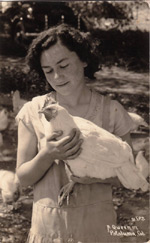A Home on the Range facts for kids
Quick facts for kids A Home on the Range: The Jewish Chicken Ranchers of Petaluma |
|
|---|---|
 |
|
| Directed by | Bonnie Burt and Judith Montell |
| Produced by | Bonnie Burt and Judith Montell |
| Release date(s) | 2002 |
| Running time | 52 minutes |
| Country | United States |
| Language | English |
A Home on the Range: The Jewish Chicken Ranchers of Petaluma is a documentary film from 2002. It was created by Bonnie Burt and Judith Montell. The film tells the story of a group of Jewish people. They came to America from Eastern Europe. They were escaping difficult times and unfair treatment. In America, they also faced some prejudice.
These families found a new home in a small, country town called Petaluma in Northern California. There, they decided to build a special community. They worked together to raise chickens to earn a living. This film shows how they created a unique way of life.
The Story of Petaluma's Jewish Chicken Ranchers
A Home on the Range uses old photographs and videos. It also includes interviews with people who used to live there. The film shows what life was like in Petaluma. It was a community where people worked hard on farms. They also enjoyed learning and sharing ideas.
The Jewish people of Petaluma shared a strong culture. They cared for each other like a big family. They faced challenges like unfair treatment before World War II. They also dealt with strong feelings against socialist ideas during the McCarthy era. Despite this, they stayed strong together. Over time, this special community became smaller. Today, their chicken farms have been replaced by other businesses. These include telecommunication centers, dairy farms, and vineyards.
For many Jewish people in Petaluma, their Judaism was more about culture than religion. The film shares stories about this. One person said they celebrated holidays for social reasons. Another even said, "Judaism—there wasn't any!" This shows that for these farmers, being Jewish meant speaking Yiddish. It meant eating matzah and forming a close-knit group, like a kibbutz.
Most importantly, it meant they were often seen as outsiders in America. They were sometimes called mean names or treated unfairly. One woman in the film remembered being called a "dirty Jew." Another woman recalled a scary night. A neighbor who disliked Jewish people had a loud party. The noise and crowd frightened her parents. They could not sleep that night. There was also a time when non-Jewish leaders in a nearby town acted unfairly. They attacked some men from Petaluma because they disliked Jewish people and their ideas.
The film shows that after many years in Petaluma, Jewish Americans were no longer treated badly. They became more a part of American society. The lively community of chicken ranchers in Petaluma slowly faded away. One woman grew up on a ranch and raised her own children there. She shared her mixed feelings about this change. She missed the strong feeling of community she once had. But she also admitted that she and her neighbors were "accepted as Americans."
Who Made This Film?
Bonnie Burt has been making documentaries for twenty years. Her films often explore Jewish life. Her movies have been shown at famous places. These include the Museum of Modern Art and Lincoln Center in New York.
In 1992, Bonnie Burt worked with Judy Montell. Together, they produced A Home on the Range.

